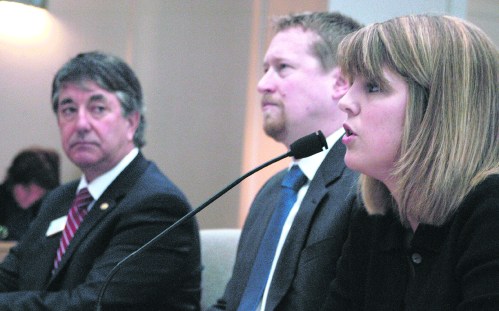Label initiative reaches Senate
Published 8:57 am Thursday, February 21, 2013

- Steve Brown/Capital Press Speaking before the Senate ag committee on Feb. 14 are, from left, Eric Maier of the Washington Association of Wheat Growers, James Curry of Northwest Food Processors Association and Holly Chisa of the Northwest Grocers Association. All three opposed Initiative 522.
Hatfield: ‘Most proponents know this is going to the ballot’
By STEVE BROWN
Capital Press
OLYMPIA — A hearing before the Agriculture, Water and Rural Economic Development Committee is likely as far as the biotech labeling initiative will get in the state Senate.
“I don’t think there’s four votes,” the number that would be needed to get the initiative out of committee, chairman Brian Hatfield, D-Raymond, said.
Initiative 522, which would mandate labeling most foods that have genetically modified ingredients, will also be heard in the House ag committee. The tentative date is March 6.
Lawmakers have three options for I-522:
* Adopt the initiative as proposed, in which case it becomes law without a vote of the people.
* Reject or refuse to act on the proposed initiative, in which case it will be placed on the ballot at the next state general election.
* Approve an alternative to the proposed initiative, in which case both the original proposal and the Legislature’s alternative will be placed on the ballot at the next state general election.
“Most proponents know this is going to the ballot,” Hatfield said, “but the hearing gives all the sides a chance to speak.”
Amid all the voices heard before his committee on Feb. 14, he said, the fiscal note “was barely mentioned.”
According to the fiscal note summary, revenues, in the form of civil filing fees, are expected to total $2,400 per year. Expenditures at the Department of Health, which would have authority for rule-making and enforcement, are predicted to total about $400,000 in startup costs and operations for the 2013-2015 biennium. After that costs are predicted to be about $1.5 million per biennium.
Robert McGuire, speaking for the Biotech Industry Organization, said a provision allowing any person to bring a lawsuit against an alleged violator is “bad law.” He said he sees that as “a cash cow of shakedown lawsuits.”
Also unfair is a provision awarding attorney fees to the plaintiffs if they win a lawsuit, said Doug Jones, an Idaho farmer and executive director of Growers for Biotechnology. He said fees should be awarded to the prevailing side.
Speaking for the Washington Farm Bureau, Tom Davis said labeling foods would be “a legal liability nightmare for our farmers. It would require chain of custody from the field to the grocery store. Farmers cannot afford that type of process.”
Tom Stahl, who grows wheat, barley and peas in Central Washington, said he expects Monsanto to have a major financial impact on the initiative campaign, as it did in California’s Proposition 37. Pointing to the 353,331 signatures gathered on petitions, “Public support can make up for what Monsanto can spend,” he said.
“Monsanto is an irresistible force. Our foreign customers are an immovable object,” Stahl said. “There’s a collision coming, and the farmers are in the middle. We could be destroyed.”
Trudy Bialik, with PCC Natural Markets, said commonly engineered foods include alfalfa, canola, corn, papaya, soy, sugar beets, zucchini and yellow summer squash — “not an overwhelming list.”
Labeling, she said, is a “business decision,” whatever one thinks about the science.





